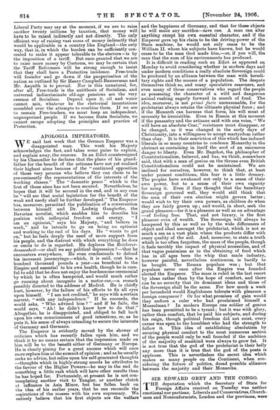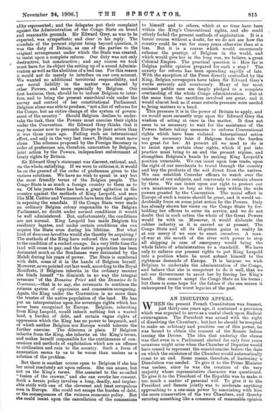SIR EDWARD GREY AND THE CONGO. T HE deputation which tbe
Secretary of State for Foreign Affairs received on Tuesday was neither emotional nor partisan. Liberals and Conservatives, Church- men and Nonconformists, London and the provinces, were' alike represented; and the delegates put their complaint against the Administration of the Congo State on broad and reasonable grounds. Sir Edward Grey, as was to be expected, was sympathetic and clear in his reply. The scandals of the present regime being beyond question, it was the duty of Britain, as one of the parties to the original arrangement under which the State was created, to insist upon a complete reform. Our duty was not only destructive, but constructive ; and any course we took must have for its object the setting up of a sound Adminis- tration as well as the abolition of a bad one. For this reason it would not do merely to interfere on our own account. We wanted no additional territorial responsibility, and our moral liability in the matter was shared by other Powers, and more especially by Belgium. Our first business, then, should be to induce Belgium to inter- fere, and to bring the present anarchical rule under the survey and control of her constitutional Parliament. Belgium alone was able to produce, "not a list of reforms for the Congo, but an entire change of the system of govern- ment of the country." Should Belgium decline to under- take the task, then the Powers must exercise their rights under the Convention. Sir Edward Grey thinks that it may be easier now to persuade Europe to joint action than it was three years ago. Failing such an international effort, and only in the very last resort, Britain must move alone. The schemes proposed by the Foreign Secretary in order of preference are, therefore, annexation by Belgium, joint action by the Powers, independent enforcement of treaty rights by Britain.
Sir Edward Grey's statement was discreet, rational, and, on the whole, satisfying. If we were to criticise it, it would be on the ground of the order of preference given to the various solutions. We have no wish to speak in any but the most friendly terms of the Belgian people. The Congo State is as much a foreign country to them as to us. Of late years there has been a great agitation in the country against the methods of King Leopold, and men like MM. Cattier and Vermeersch have been the chief agents in exposing the scandals. If the Congo State were made an ordinary Belgian colony responsible to the Belgian Parliament, no doubt under normal conditions it would be well administered. But, unfortunately, the conditions are not normal. King Leopold has made Belgium his residuary legatee, and under certain conditions she can acquire the State even during his lifetime. But what kind of damnosa hereditas would she thereby be acquiring ? The methods of the King have reduced this vast country to the condition of a sucked orange. In a very little time the laud will cease to pay, and the native population has been decimated much as the Soudanese were decimated by the Mahdi during his years of power. The State is cumbered with debt, some of it in the hands of Belgium herself. Moreover, as we pointed out last week, according to the Royal Manifesto, if Belgium inherits in the ordinary manner she binds herself "to diminish in no way the integral revenues" of the Domaine Priv4 and the Domains de la Couronne,—that is to say, she covenants to continue the ruinous system of oppression and concession-mongering. Again, the King under the Convention is no more than the trustee of the native population of the land. He has put an interpretation upon his sovereign rights which has never been recognised by Europe. Belgium, inheriting from King Leopold, would inherit nothing but a wasted laud, a burden of debt, and certain vague rights of oppression which the King has no power to bequeath, and of which neither Belgium nor Europe would tolerate the further exercise. The dilemma is plain. If Belgium inherits from the King, she inherits on the King's terms, and makes herself responsible for the continuance of -con- cessions and methods of exploitation which are an offence to civilisation and ruin to the country. Such a form of annexation seems to us to be worse than useless as a solution of the problem.
But there is another course open to Belgium if she has her mind resolutely set upon reform. She can annex, but not on the King's terms. She assented to the so-called "fusion of the crowns," and she can revoke her consent. Such a heroic policy involves a long, deadly, and implac- able strife with one of the cleverest and least scrupulous men in Europe. She could not escape the burden of debt, or the consequences of the ruinous economic policy. But she could insist upon the cancellation of the concessions to himself and to others, which at no time have been within the King's Conventional rights, and she could utterly forbid the present methods of exploitation. It is a heroic course without a doubt, for we do not see how the country could be run for many years otherwise than at a loss. But it is a course which would enormously enhance the prestige of Belgium in the world, and. -which would give her in the long run, we believe, a great Colonial Empire. The practical question is : How far is Belgian public opinion prepared for such a step ? The anxiety for reform has been spreading rapidly of late. With the exception of the Press directly controlled by the King, Belgian newspapers have taken Sir Edward Grey's words seriously and courteously. Many of her most eminent public men are deeply pledged to a complete overhauling of the whole Congo administration. But at the same time the sacrifices involved are great, and it would almost look as if some outside pressure were needed to bring matters to a head. this pressure it is in the power of Britain to apply, and we would most earnestly urge upon Sir Edward Grey the wisdom of acting at once in the • matter. It does not seem to us necessary to wait for the assistance of the Powers before taking measures to enforce Conventional rights which have been violated. International action may be necessary later if Belgium finds the burden too great for her. At present all we need to do is to insist upon certain clear rights, which if put into practice must bring to an end the present regime, and strengthen Belgium's hands by making King Leopold's position untenable. We can insist upon free trade, upon the right of our merchants to travel through the country and buy the products of the soil direct from the natives. We can establish Consular officers to watch over the interests of our subjects, and conversely to restrain abuses by them. We can insist upon our right to protect our own missionaries so long as they keep within the wide powers granted by the Convention. The moral effect in Europe of such a course should be great, and it would un- doubtedly force on some joint action by the Powers. Italy has already shown her views on the Congo State by for- bidding her officers to enter its service, and we do not doubt that in such action the whole of the Great Powers would be with us. Moreover, it would dislocate the rubber industry as it is carried on at present. The Congo State and all its ill-gotten gains in reality lie at our mercy if we care to exert ourselves. A man- of-war at the mouth of the river with power to stop all shipping in case of emergency would bring the whole fabric of administration to a standstill. We have only to enforce our present rights to put King Leopold into a position where he must submit himself to the righteous demands of Europe. It is because we wish Belgium to undertake the administration of the Congo, and believe that she is competent to do it well, that we ask our Government to assist her by forcing her King's hand. She cannot accept the Congo State on his terms ; but there is some hope for the future if she can secure it unhampered by the worst legacies of the past.















































 Previous page
Previous page